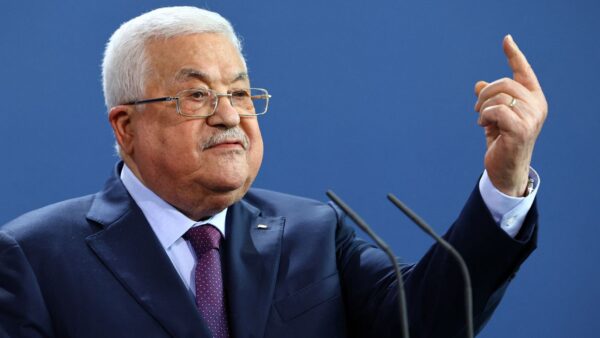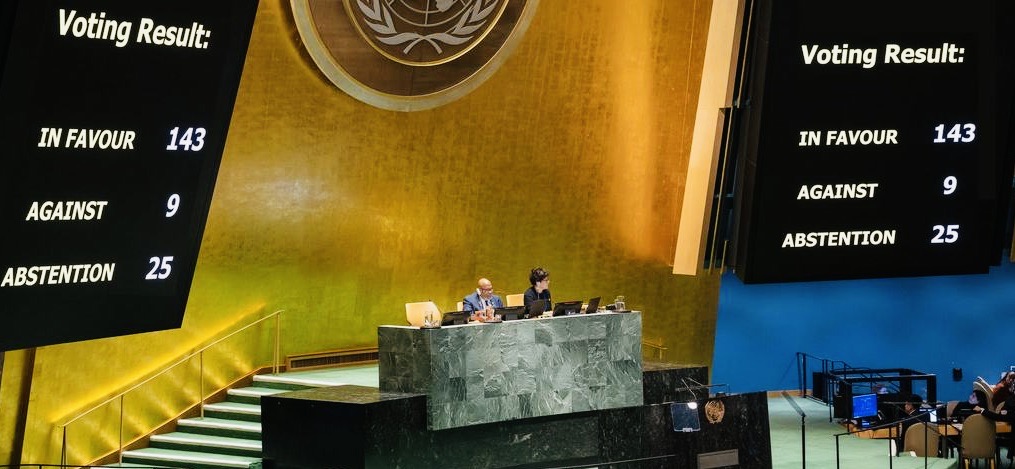Shortly before the United Nations General Assembly adopted a resolution on May 10 declaring that the Palestinians qualify for full membership and are eligible for further rights as an observer state, Israel’s ambassador to the UN, Gilad Erdan, claimed that a vote for Palestinian statehood would usher in “a state of terror” and reward “terrorists” who murder Jewish civilians.
As expected, Erdan’s impassioned plea fell on deaf ears.
The largely symbolic resolution, devised by the United Arab Emirates and sponsored by 70 nations, passed by an overwhelming margin, 143-9, with 25 countries abstaining.
Three of the permanent members of the UN’s Security Council, Russia, China and France, were in favor of it. Britain cast an abstention. The United States came out against it.

Judging by the essence of the resolution, Israel finds itself virtually isolated on this pivotal issue. Apart from Israel and the United States, Israel’s closest ally, the only countries that opposed it were the Czech Republic, Hungary, Argentina and a handful of Pacific island states that most people could not even find on as map.
After the massacre of October 7, during which Hamas terrorists killed 1,200 Israeli civilians, soldiers and foreign workers in southern Israel, Israelis are understandably wary of endorsing the establishment of a Palestinian state in the West Bank and the Gaza Strip. The passions are still too raw.
Yet, contrary to Erdan’s assertion, Palestinian statehood would not necessarily lead to more terrorism. Nor should it be regarded as a reward to terrorists.
If anything, Israel’s occupation of the West Bank engenders Palestinian anger, resentment, violence and terrorism. On the other hand, a negotiated two-state solution offers the hope of coexistence between Israelis and Palestinian Arabs. It would also be a rebuke to Hamas and Iran, which seek Israel’s destruction and a one-state solution, a euphemism for a Palestinian Arab state.
If a two-state solution is to be achieved, Israel must destroy Hamas’ military infrastructure, kill its foot soldiers and hunt down its venal leadership starting with Yahya Sinwar. Israel’s current operation in Rafah, Hamas’ last urban stronghold, falls within this parameter. As long as Hamas governs Gaza, a two-state solution will be unrealistic and unattainable.

Yet Hamas is not the only obstacle on the path toward the creation of a demilitarized Palestinian state alongside Israel. Netanyahu’s right-wing government is a vehement adversary of Palestinian self-determination, much to Israel’s detriment.
Netanyahu, too, has not developed a reasonable plan for what comes after the war. According to Israeli media reports, the commander of the Israeli armed forces, General Herzi Halevi, has criticized Netanyahu for not having a formulated a “day after” strategy for post-war governance in Gaza. Levi reportedly told Netanyahu that Israeli forces have been compelled to return to areas in Gaza, such as the north, where Hamas has supposedly been subdued. The reason is clear. Due to an absence of a political horizon, Hamas has been regrouping.

“If there’s no diplomatic process to develop a governing body in the Strip that isn’t Hamas, we’ll have to launch campaigns again and again in other places to dismantle Hamas’s infrastructure,” Halevi warned Netanyahu. “It will be a Sisyphean task.”
With this in mind, Netanyahu should consider the argument that a Palestinian state at peace with Israel is in Israel’s national interest. But Palestinian statehood should be phased in over a period of years so that Israel’s misgivings and fears can be allayed. Israel needs to be assured that a Palestinian state will not be a threat to its well-being and security. Israel needs to know that a two-state solution could well bring peace, prosperity and stability to the region.
The status quo is untenable and will not work. It will cause only more instability, chaos and the tragic loss of yet more lives. Is this what Israelis want? It’s doubtful.
Israel, with or without Netanyahu at its helm, should accept a strategic proposal by the United States to link Palestinian statehood with the normalization of relations between Israel and Saudi Arabia. Under this pragmatic plan, the Palestinians would embark on a diplomatic pathway toward independence and sovereignty, while Israel and Saudi Arabia would build the scaffolding of a new and important relationship, which could very well alter the political landscape of the Middle East.

Needless to say, the anemic leadership of the ineffectual Palestinian Authority would have to be revamped during this crucial process. Mahmoud Abbas, its current president, and many of his corrupt cronies will have to be replaced with fresh, technocratic leaders unburdened by the strictures of Palestinian rejectionism.
The United States, in voting against the UN resolution on Palestinian membership, understood that a two-state solution cannot be imposed.
As John Kirby, the White House national security spokesman, said, “We continue to believe in the power and promise of a two-state solution, and an independent state for the Palestinian people. We also believe that the best way to do that is through direct negotiations with the parties and not through a vote of the UN of this kind.”
The U.S. ambassador to the UN, Robert Wood, spelled out American policy in greater detail. His comments are well worth reproducing. As he said, “President (Joe) Biden has been clear that sustainable peace in the region can be achieved only through a two-state solution, with Israel’s security guaranteed, where Israelis and Palestinians can live side by side with equal measures of freedom and dignity. It remains the U.S. view that unilateral measures at the UN and on the ground will not advance this goal. This General Assembly resolution was no exception, and so the United States voted ‘no.’

“Our vote does not reflect opposition to Palestinian statehood. We have been very clear that we support it and seek to advance it meaningfully. Instead, it is an acknowledgement that statehood will come only from a process that involves direct negotiations between the parties. There is no other path that guarantees Israel’s security and future as a democratic Jewish state. There is no other path that guarantees Palestinians can live in peace and with dignity in a state of their own. And there is no other path that leads to regional integration between Israel and all its Arab neighbors, including Saudi Arabia.
“The United States is committed to intensifying its engagement with the Palestinians and the rest of the region to advance a political settlement that will create a path to Palestinian statehood and subsequent membership in the United Nations.”
Realistically speaking, this is the path that the Israeli government and the Palestinians should take, particularly after the conclusion of the Israel-Hamas war.
Israel cannot live in constant strife with its Palestinian neighbors. Nor should the Palestinians be deprived of statehood in their ancestral lands.
Partition is the only way forward. The alternative solution, which has always resulted in bloodshed and tears, is a non-starter.
